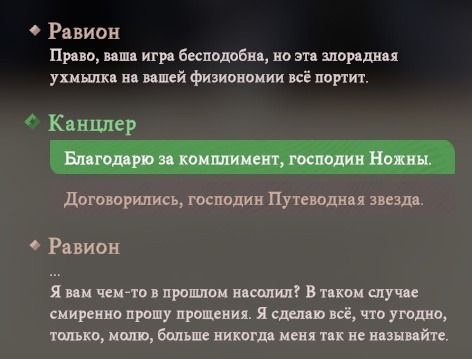#ГОСПОДИН
Explore tagged Tumblr posts
Text

HE'S GONNA FUCKING KILL HIM
#sore subject#“господин пусти меня я ему щас втащу!”#the vampire chronicles#blood communion#armand#the vampire benedict#benedict de landen
26 notes
·
View notes
Text
"Я никогда не повторяюсь".

23 notes
·
View notes
Text


...зато теперь мы знаем что Равион снизу, a win is a win
#господин ножны#простите меня ещё не скоро занесёт обратно#afk journey#afk ravion#afk indris#afk meme
22 notes
·
View notes
Text

❝ Nothing the Creator has made is suitable for human life . . . He creates, and I have to fix it. ❞
#mister designer#Gospodin oformitel#Господин оформитель#platon andreevich#russian film#soviet film#my art
24 notes
·
View notes
Text
Шок, в сеть слили один из промежуточных вариантов дизайна Марка Бессмертника

41 notes
·
View notes
Video
youtube
I was curious to see how differently Gaunter o'Dimm is perceived in different parts of the world, a children's song that reveals a lot, still not complete if you take just one local translation, but if you collect them all and compare/combine... Here's what I got.
Memoirs of Professor Shakeslock: On the Enigmatic Bargainer
There are few figures in myth and legend as haunting as the one described in the verses I have studied, collected from various cultures and tongues. If one were to hear only a single version of the song, they might dismiss it as mere folklore—a simple cautionary tale of temptation and consequence. Yet, when one gathers every fragment, every whispered warning from across languages and lands, a far darker truth begins to emerge. The pattern remains eerily consistent: a being of captivating charm, offering all that the heart desires, only to return for a price no mortal can truly fathom. I shall here reconstruct the image of this entity, drawing solely from these ballads, piecing together what the poets—perhaps eyewitnesses, perhaps victims—have left behind as a warning to those who listen.
From the first moment he steps into view, this being possesses a face of striking beauty. In the Polish song, it is said his "Liczko ma gładkie"—his face is smooth, untouched by time. The German verse likewise affirms his pleasing appearance, stating "Sein Antlitz ist schön"—his face is fair. More vividly still, the French describe his visage as "doux"—gentle, comforting, even innocent, while the English ballad likens his smile to spring itself, a season of renewal and fragile hope.
Notably, most sources emphasize his smile, his amicable and inviting expression. The Portuguese version captures this directly: "Com um sorriso maroto"—with a mischievous smile, suggesting both charm and cunning in equal measure. It is this very allure that makes him so dangerous—his face is not merely pleasant but designed to disarm, to invite trust, to make one believe in the sincerity of his gifts.
But appearances deceive. Only the Russian testimony hints at the chasm beneath: "Только в глазах стоит холод могильный"—his eyes hold the cold of the grave. A subtle yet chilling contradiction: the youthful beauty, the angelic words, and those ancient, unfeeling eyes. If this is indeed a mask, then it is masterfully crafted, one meant to lure rather than to reveal.
It is not merely his face that captivates, but his voice. The Portuguese tell us that "Diz coisas bem doces"—he speaks sweetly, his words sugar-coated temptation. In the Polish song, they are flowery, and in the German, fantastic. Yet, the English version grants him a tongue sharp and silvery, suggesting not just enchantment but a keen wit, a mind as quick as it is persuasive. His words are not merely sweet—they are precise, calculated, honed to cut through doubt and resistance like the finest blade. The French, ever poetic, state that "Ses mots vous ensorcellent"—his words bewitch, implying not persuasion, but an irresistible enchantment.
Most striking of all, the Japanese text warns that "誰もあらがえない"—no one can resist his words. A force beyond mere rhetoric, beyond charisma. One must wonder, then, whether his words shape the world itself, or whether they merely unravel the listener’s will until no thought remains but compliance.
Though his appearance and voice suggest charm, the songs themselves reveal a far darker reality. The Polish version does not mince words: "Czarci ten pomiot z naturą nieczystą"—the devil’s spawn of an impure nature. The Germans echo this sentiment, stating: "Doch dieser Teufel ist verdorben und garstig"—this devil is corrupt and vile. The French, too, names him outright: "L’engeance du démon"—the spawn of a demon. The Japanese version leaves no room for doubt either, referring directly to "悪魔の素顔"—the true face of the devil—revealing him not as a mere deceiver, but as a fiend whose true nature lurks beneath his inviting exterior.
While most sources declare him to be something infernal, the English and Russian versions notably refrain from directly calling him the devil. Instead, they paint him as a being of mystery and power, neither confirming nor denying his abyssal origins. Does he merely play the role of the tempter, or is he truly a creature of the void, wearing a mortal guise? The ambiguity in these versions does not make him any less terrifying—it only deepens the unease. He is something beyond human comprehension, a force that does not need to name itself, for its actions speak louder than any title.
No wish is beyond his grasp. The Portuguese tell us he grants "ouro sem demora"—gold without delay. The Russian version affirms that he bestows wealth in silver and gold, and the Poles expand upon this: "da ci brylanty"—he gives diamonds as well.
Curiously, both the Japanese and English versions introduce another aspect: love. The Japanese states, "願いをかなえ 愛を誓い"—"he fulfills wishes and swears love," while the English echoes this sentiment with "as he swears to adore you." This singular detail, absent from all others, forces us to reconsider his methods. Is he merely granting love as a wish, bestowing it like gold or jewels? Or does he offer his own love, entwining himself with those who accept his gifts? If so, is this love genuine, or is it another instrument of control? Does he whisper of devotion, not as a promise, but as a bond that can never be severed? One cannot say, but the question lingers like a half-remembered dream, unsettling in its implications—for if he loves, what kind of love does such a being know?
“Только не даром так добр он к людям"—yet, his kindness to people is not without a price. If he gives freely, it is only because he will come to collect. The debt is never forgotten. The Portuguese warn us first: "Depois cobra um preço e você só chora"—he demands payment, and you only weep. The Russian song is more measured: "по счетам платить будем"—we will settle accounts. The French, however, introduce a chilling variation: "Le prix à payer est un grand sacrifice"—the price to pay is not merely wealth, but something far greater. A sacrifice.
Yet in the Russian version, another, subtler truth emerges: "Сокровища враз тебе станут постылы"—the treasures themselves will become loathsome to you. It is not merely that he will take them back, but that they will no longer bring happiness. His gifts, meant to satisfy desire, are poisoned from the start. Wealth loses its joy, love turns hollow, and what once seemed a blessing becomes a curse long before the collector arrives.
If one believes they may outwit him, break free of his snare, they are gravely mistaken. The Portuguese warn, "O diabo te prende e nunca vai embora"—the Devil traps you and never leaves. The Russians, grim as ever, confirm: he will shackle you forever. Yet the true horror is not merely captivity but what follows.
The French version unveils the first stage of this inescapable doom: "Votre raison, votre âme et vos tourments lui appartiendront jusqu'à la fin des temps"—your mind, your soul, and your suffering shall belong to him until the end of time. He does not simply take back his gifts; he takes you. The soul is seized, stripped of ownership, made a possession, bound to him for eternity. It does not pass on, it does not fade—it remains, enduring, suffering, lost.
But this is not the final cruelty. The Portuguese song reveals what follows: "Na noite escura a tua alma devora"—in the dark of night, he devours your soul. That which he claimed is not merely held—it is consumed. There is no mere loss of freedom, no simple debt to be paid—he takes everything, even what defines you, and ensures there is nothing left to reclaim.
The Polish and German verses stretch the suffering beyond human comprehension: "Byś cierpiał katusze, aż gwiazdy zgasną"—you shall suffer torment until the stars go out. The Germans echo this phrase without alteration, as if two voices, centuries apart, saw the same vision of endless pain. Eternal agony, boundless and unrelenting, measured only by the slow death of the cosmos itself.
And then, the English version delivers the cruelest image of all: "To gore and torment you, till the stars expire." Gore. This is no passive imprisonment, no mere existence in chains—it is an eternity of butchery, of suffering so visceral that it is written in blood and steel. The Japanese version, softer in phrasing but no less damning, speaks the same truth: "苦しみは続く この夜空に 星が光る限り"—the suffering continues as long as the stars shine in the night sky.
No matter the language, no matter the words, the fate remains the same.
There is no escape, for the soul is first seized, then devoured—and nothing remains.
He is no mere merchant, no wandering trickster, nor some capricious fae dealing in playful bargains. He is something older, something patient—something that waits in the shadows of time, knowing that all debts must be paid. His gifts, gleaming with promise, are nothing but gilded chains; his whispered love, a snare that tightens unseen. What he grants is never truly yours. What he takes, you will never reclaim.
And when he comes to collect, he does not merely strip away wealth, nor merely shackle the flesh—he drains the marrow of the soul itself, eroding the will, unraveling the self, until nothing remains but agony stretched across eternity. No plea will move him. No force will halt him.
He is not a demon among demons, nor a devil of folklore, but something far worse—a force beyond name, a hunger older than sin, a debt that predates existence itself. The poets and the damned have given him many names, yet all fall short of capturing his essence. He is the Evil Incarnate, the harbinger of ruin disguised in the fair trappings of fortune. He does not tempt—he ensures. He does not bargain—he collects.
Beware, then, the smile of spring. For what blooms beneath its warmth is not life, but the slow, silent rot of the inevitable end.
#gaunter o'dimm#master mirror#man of glass#pan lusterko#gaunter de meuré#господин зеркало#Гюнтер о'Дим#Spiegelmeister#Gaunter o'Dim#Mann des Glases#Szklany Człowiek#Senhor Espelho#homem de vidro#ガウンター・オーディム
8 notes
·
View notes
Text








Mister Designer (Господин оформитель) — Oleg Teptsov, 1988
#mister designer#gospodin oformitel#господин оформитель#виктор авилов#олег тепцов#юрий арабов#praise the dollmaker#viktor avilov#oleg teptsov#yuri arabov#soviet horror
13 notes
·
View notes
Text
Когда-нибудь я смогу загрузить здесь посты по этой дораме и насладиться лучшими кадрами, но за неимением нормальной скорости просто напишу, что она 100/10.
Стекло стеклянное.
Называется "Господин Планктон".

3 notes
·
View notes
Text
spare me, great lord
ok, I have watched this anime (absolutely fell in love with the opening and music 💕) and now I need more content bc... idk there are so many options to make it
and I can find NOTHING
there are novel with awful translation and manhua, which I also don't really like
how should I live?
1 note
·
View note
Text
Бертольд Вольц.
Навязчивый господин.
1874г..
💥💥💥
Вольц Бертольд (1829 — 1896) немецкий художник известен своими тонко и искусно исполненными портретами. Широкую известность принесла картина "Надоедливый джентльмен".
Она недавно была продана за 1,7 миллионов долларов.
Усатый хлыщ в очках проявляет назойливое внимание к попутчице в купе поезда, явно потерявшей близкого человека, на что указывают заплаканное лицо и траур.
Никакого уважения к девушке у него нет, даже курить в ее сторону не стесняется.
По этикету того времени, если девушка путешествует одна, то этот факт ставит её репутацию под сомнение, это может послужить поводом для сплетен, презрения и прочих неприятных вещей.

0 notes
Text
#ao3feed#fanfiction#tomarry#harrymort#tomarrymort#SecondHome#Господин Министр#у меня к вам дело личного характера
0 notes
Text

ШЕЕЕЕЕСТ ОСЕЕЕЕЕМ ЕДНОООООООО
1 note
·
View note
Text
Моему коту всего два месяца, а он уже ведёт себя, как пенсионер, и пенсионер с деменцией: мажет дерьмо на стены; требует еды, когда та уже у него в миске.
8 notes
·
View notes
Text
Okay, I was reading through all the mentions of Amadeo calling Marius Master in Russian and thought 'Huh, I wonder what word he's actually using'. And then I realized that I'm dumb as fuck and I can just look in the Russian copy of the book lmao.
Anyway he uses variations of master and sir (господин and мастер and sometimes сударь) but this wasn't what actually caught my attention because I discovered that he uses an informal you (ты instead of Вы) to refer to him. Even in the past, when they were in Venice! :000000000000
This is a huge thing. The contrast between very formal Master and informal you is insane and just bring out the duality of their relationship even more.
Also the 'Cherub, I want you' was translated as 'Cherub, I miss you/I need you' and I'm just dead on the floor, sobbing.
#the translation overall is not the best but this decision is 10/10#the vampire chronicles#the vampire armand#blood and gold#marius de romanus#armand#marimand
36 notes
·
View notes
Text
Персонаж для ролплея. Впервые буду ролить с живым (!) человеком, так что пришлось постараться

Друг также попросил заполнить анкету вдобавок к обложке моего персонажа, так что пришлось постараться.
Имя: Артур Корал
��озраст: 42
Рост: 184
Хуй: "Прошу прощения?"
Хобби: "Хобби, да? Чтение, безусловно, одно из них. Я не могу насытиться хорошей книгой. Полагаю, можно сказать, что я немного библиофил. А если я в хорошей компании, то с удовольствием сыграю в шахматы пару партий"
Информация: Преподаватель истории и литературы на вашем потоке
Во время своей педагогической практики в начальных классах молодой господин Корал понял, что ненавидит капризных детей, поэтому пошёл преподавать в колледж. К сожалению, это загадка о двух стульях, так что теперь мужчина имеет дело с заносчивыми подростками, которые знают лучше него.
Получил степень магистра социологии и антропологии в Лондоне. В начале 2000-х он переехал в Канаду, так как был влюблен в канадку; к сожалению, отношения закончились плохо, хотя Артур решил остаться в Канаде, чтобы продолжать там преподавать.
Известен как не самый плохой учитель, хотя студенты склонны его бояться.
Он придерживается политики нулевой терпимости к списыванию и плагиату.
Немного кринжовенькая анкета, особенно вариант с размером хуя. Я отказываюсь заполнять такие подробности для моего старика. Вдруг у него сердце не выдержит
тгк: artist_drips
#art#my art#artists on tumblr#fanart#artwork#digital art#drawing#original art#oc#original character#old man yaoi#lol
23 notes
·
View notes
Text
There’s one song that strongly reminds me of The Terror. Actually, it inspired by the mountain climbing in the Caucasus. Someone says that this song dedicated to author’s friend, who has died during his climbing. It makes the song even more sad, but personally | prefer thinking that this song more figurative and philosophical.
the song “Господин горных дорог” by Мельница (“The Master of a mountain roads” by Melnitsa)
So there is some lyrics that reminds me of Francis Crozier:
Пусть укроет цепи следов моих иней,
(Let the frost cover the chains of my traces) Чтоб никто найти их не мог.
(So that no one can find them) Кто теперь прочтет подо льдом твое имя,
(Who’s going to read your name under ice now?) Господина Горных Дорог?
(Master’s of the Mountain Roads?)



24 notes
·
View notes